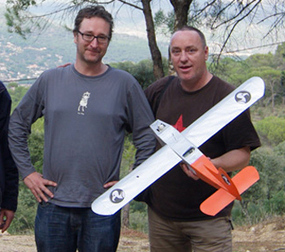 Your new post is loading...
 Your new post is loading...
What accounts for the flexibility of views on this seemingly fundamental principle? “We take a functional perspective,” says Hehman. “Both groups seek to enhance their collective group identities.” For the majority, he explains, “the feeling is: the other group can come join us and give up their values. That preference benefits the majority by maintaining the status quo with no cost to them.” Meanwhile, “the minority wants to maintain its group-esteem and cultural identity. It’s threatening when the majority wants to assimilate them.”
Dr. Nicholas Christakis is known for his research on the social factors that affect health, health care, and longevity. In his lecture "If You’re So Free, Why Do You Follow Others? The Sociology and Science Behind Social Networks," part of Floating University's Great Big Ideas course, Christakis explains why individual actions are inextricably linked to sociological pressures. Whether you’re absorbing altruism performed by someone you’ll never meet or deciding to jump off the Golden Gate Bridge, collective phenomena affect every aspect of your life.
Robots and mythical creatures battle each other in cartoon-like drawings spread across a table. A crowd gathers around to take a closer look at the vibrantly colored images from the pages of the award-winning comic book Rocketo.
Why do we stick up for a system or institution we live in—a government, company, or marriage—even when anyone else can see it is failing miserably? Why do we resist change even when the system is corrupt or unjust?
When Facebook was founded in 2004, it began with a seemingly innocuous mission: to connect friends.
Take a look at the virtual upgrade of an old thought experiment, conducted by Carlos David Navarrete, a psychologist at Michigan State University. Which should win out - personal morality or the greater good?
Pagan gods traditionally required human sacrifices – preferably of children – and a West Country academy school appears to be leading the way. To give pupils a lesson in "sustainability" they'll never forget, headmaster Rob Benzie of Ansford Academy in Castle Cary, Somerset, ordered a "No Power Day ... as an experiment to see if we can lower our carbon footprint". It took place in December as temperatures plummeted to 1°C, and pupils students were permitted to cheat death by wearing as many jumpers as they could muster. All survived. Predictably, reactionary parents branded it as "barbaric" – ignoring the vital "awareness raising" potential of the experiment. An innovative game in Australia even advised children when they should pop off to help save the Earth Goddess.
New research from The CIBC Centre for Human Capital and Productivity at The University of Western Ontario shows that education, and related education-based initiatives, can reduce crime rates, improve health, lower mortality rates, and increase...
A new study shows that 'agreeableness' correlates negatively with how much money men earn. According to Notre Dame researchers, 'agreeableness' is a combination of trust, straightforwardness, compliance, altruism, modesty and tender-mindedness. Men who were found less agreeable were not sociopaths or maniacs but they were willing to aggressively advocate for their position during conflicts. The difference in pay was stunning: agreeable men earned an average of $7,000 less than their bristly peers.
Men may think about sex more often than women do, but a new study suggests that men also think about other biological needs, such as eating and sleep, more frequently than women do, as well.
A new survey of teen girls and reality TV finds some surprising -- and positive -- trends.
Some atheist scientists with children embrace religious traditions for social and personal reasons, according to research from Rice University and the University at Buffalo -- The State University of New York (SUNY).
In the past 20 years, the Amish population in the US has doubled, increasing from 123,000 in 1991 to 249,000 in 2010. The huge growth stems almost entirely from the religious culture’s high fertility rate, which is about 6 children per woman, on average. At this rate, the Amish ...
|
Your parents were right: Hard experiences may indeed make you tough. Psychological scientists have found that, while going through many experiences like assault, hurricanes, and bereavement can be psychologically damaging, small amounts of trauma may help people develop resilience.
A father in Louisiana bludgeoned and beheaded his disabled 7-year-old son last August because he no longer wanted to care for the boy.
Researchers studied interviews of 41,000 residents of 31 European nations and found civic pride was most linked to a general feeling of well being.
Holiday shoppers, take note. Marketing and psychology researchers have found that in gift giving, bundling together an expensive 'big' gift and a smaller 'stocking stuffer' reduces the perceived value of the overall package for the recipient.
Researchers figure out why, in some cases, we experience schadenfreude, or joy in the misfortune of others. Turns out, the emotional blip provides a self-affirming boost, making us feel better about ourselves.
How to be interesting (in 10 stupid-simple steps):
Manliness, Mansfield tells us in his book with that title, refers to the "spirited" (thumotic) part of the soul that Plato was very careful to distinguish from the soul's rational and desiring parts. So the fact of manliness is one reason we can turn to Plato to remember that we're not minds or bodies or even a mixture of the two. We human beings are some third entity that refuses to be reduced to either mind or body.
If you get a bad reputation, you're going to get noticed. That little bit of homespun wisdom might actually become a verifiable scientific fact, as new research indicates people really do prefer to look at people with bad reputations.
“If the young are not initiated into the tribe, they will burn down the village just to feel its warmth” (proverb) "In mainstream media, rites of passage are more often than not seen as something from another time and place and not relevant to today’s society. As a result, most of the world is, not to put too fine a point on it, in crisis. There is an awful lot of ‘village burning’ going on. Just turn on the TV or open a newspaper."
Via Lesley Rodgers
Children should have plenty of opportunities to play. * Even young children have too few such opportunities these days, particularly in school settings.
Children's reasoning about language and race can take unexpected turns, according to University of Chicago researchers, who found that for younger white children in particular, language can loom larger than race in defining a person's identity.
From the Michelin Man to the Pillsbury Doughboy, anthropomorphized brands have often been used by companies eager to put a personal face on their products. Now new research shows that thinking about brands as people can make you either take on the brand's characteristics or display the opposite characteristics, depending on how you feel about the brand.
|


 Your new post is loading...
Your new post is loading...
 Your new post is loading...
Your new post is loading...































